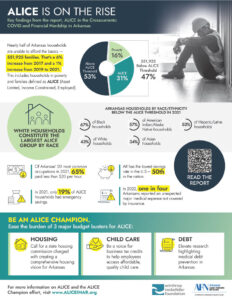
Arkansas voters set to cast their ballots for top Democrat and GOP candidates for governor and down-ballot races
PINE BLUFF, Ark — If the adage “all politics is local” is true in the upcoming Arkansas preferential primary on Tuesday (May 24), then Pine Bluff will be one of the big stories on Tuesday night as voters head to the poll to choose their state, congressional, legislative, judicial and local leaders for 2023 and beyond.
Not only do the leading Democratic gubernatorial candidate and a top Republican Party nominee for the attorney general’s office have strong ties to Pine Bluff and Jefferson County, but every ballot that voters receive in Arkansas will have at least one opportunity to choose to put a Pine Bluff native in office or not.
Heather Yates, associate professor of political science at the University of Central Arkansas in Conway, said although the gubernatorial race and other statewide offices and congressional races won’t be decided until November, the primaries will still determine a large number of losers and winners.
“While many residents are focused on the top-of-the-ticket races like the governor and the other constitutional offices, this particular primary election cycle is significant because several county-level and state legislative contests will be decided in the May primary instead of the November general election,” said Yates, who will be one of the featured guests at the Political Animals Club post-election lunch on May 25 at the Governor’s Mansion.
Still, Yates and other Arkansas political watchers know that the governor’s race will draw all the state and national attention because of the two unique candidates at the top of the ticket. On the Democratic Party ticket, Pine Bluff native Chris Jones has established himself as the clear frontrunner in fundraising and recent polling. A week before the primary election ended, Jones’ candidacy brought Democrat Party Chair Jaime Harrison to town to raise funds and help push the state’s minority party’s “get out to vote” campaign.
In a highly watched May 8 survey by Talk Business & Politics and Hendrix College, nearly 60% of Arkansas voters participating in the Democratic primary plan to support Jones’s campaign for the state’s top office. If the former Innovation Hub executive director and nuclear engineer wins the Democratic primary, he would be the first African American nominated by a major party to seek the governor’s office in Arkansas’ history.
“On the Democratic side, Chris Jones is the runaway favorite to clinch the party’s nomination for governor, garnering 60% of the vote,” said Robert Coon, managing partner with Impact Management Group, which works with Republican political candidates and helps analyze the latest Talk Business poll. “None of the other potential Democratic contenders even crack 5%. As the only candidate to spend any real dollars on a campaign, Jones leads the field across every demographic group.”
In Jefferson County, the 13 days of early voting will end on Monday. Since voting began on May 9, voters have the choice to vote by absentee ballot, early vote or cast their ballot on election day. Arkansas is one of 15 states that conducts an “open primary” election allowing voters to select the Democratic, Republican or nonpartisan judicial ballot regardless of their political affiliation.
Not only is Jones’ possible nomination on Tuesday a historic “Black history” moment, but his older brother’s candidacy for Arkansas attorney general on the GOP ticket would also be just as talked about if not for his younger sibling. Over a year ago, Leon Jones Jr., also announced nearly a year ago that he was running for Arkansas attorney general in 2022 on the GOP ticket, joining an increasingly crowded race for the state’s second-highest elected office.
If either or both brothers are elected, the Jones siblings would make history on several fronts as the first African Americans to ascend to the highest level of Arkansas state government in either party.
And while the frontrunners in the race to replace the popular term-limited Republican Gov. Asa Hutchinson and AG Leslie Rutledge are already looking past the primary, plenty of other races on the ballot and critical hot button issues ahead will keep voters occupied until the 2022 general election on Nov. 8.
Heather Yates, associate professor of political science at the University of Central Arkansas in Conway, said. Although the gubernatorial race and other statewide offices and congressional races won’t be decided until November, the primaries will still determine a large number of losers and winners.
“While many residents are focused on the top-of-the-ticket races like the governor and the other constitutional offices, this particular primary election cycle is significant because several county-level and state legislative contests will be decided in the May primary instead of the November general election,” said Yates, who will be one of the featured guests at the Political Animals Club post-election lunch on May 25 at the Governor’s Mansion.
In Jefferson County, local political analysts say the hottest races are for the ward seats on the Pine Bluff City Council and a strong slate of Jefferson County primary races, including contests for six Justice of the Peace positions.
In Ward 1, five candidates will be vying for the open seat after Council Member Joni Alexander decided not to seek re-election. They include newcomers Danny Walker, LaTisha Brunson, Garland Trice, John Proctor, and David Knott.
In Ward 3, incumbent Ivan Whitfield is facing off against challengers Quranner Cotledge and Lanette Frazier. Challenger Cassandra Dean is running against incumbent City Councilor Steven Mays for the Ward 4 seat. The eight-member Pine Bluff City Council is The City of Pine Bluff is divided into four wards with two city councilors serving in the assigned area of the city (See map here).
Across Jefferson County, all the top elected officials are running unopposed or have no challenger until the Nov. 8 general election (see here), except incumbent County Tax Collector Lentonieal “Tony” Washington. In the primary race, he is facing former Justice of the Peace Jimmy Fisher.
County Judge Gerald Robinson is also running for re-election on the Democratic ticket but won’t face his challenger under Francis “Dutch” King until November. King is running as an Independent, which instantly put him on the fall ballot against Robinson.
Statewide primary races
Besides the Jones brother’s connection in gubernatorial and AG races, the other big headline is the campaign war chest and connections built by the GOP favorite to win Tuesday’s primary contest, Sarah Huckabee Sanders.
For Sanders, the former White House spokeswoman for ex-President Donald Trump, the recent Talk Business survey shows that she is well on her way to winning the Republican primary as the GOP nominee for governor. The poll showed that 72.3% of primary voters would choose her as their likely candidate for the state’s top office. Her lone challenger, former conservative radio host Doc Washburn, manages only to reach 16.5% in this recent survey.
“Our survey confirms one thing that we have known for a year: Sarah Huckabee Sanders is on her way to being the Republican nominee for governor and, as a result, the strong favorite to be the next governor of Arkansas,” said Dr. Jay Barth, emeritus professor of politics at Hendrix College, who is active in Democratic Party politics and helped craft and analyze the latest poll.
According to monthly campaign filings with the Arkansas Secretary of State office, Sanders spent more than $834,000 in March and reported having nearly $7.4 million on hand. Since she launched her campaign in early 2021, the daughter of former Arkansas Gov. Mike Huckabee has raised more than $14 million, a record for any state race.
But Jones and Huckabee are not the lone candidates in the primary or general election races to replace Hutchinson, the current occupant of the downtown Governor’s Mansion who is term-limited out of office at the end of 2022. In late February, ahead of the state’s campaign filing deadline, seven other gubernatorial aspirants filed as Democratic, Republican, Libertarian, or write-in candidates for the state’s highest public office, including perennial candidate Elvis Presley of Star City.
In the GOP primary contest for attorney general, Lt. Gov. Tim Griffin is running against former Huckabee aide and former state Labor Department chief Leon Jones of Little Rock. As noted, Jones is the brother of Chris Jones, the leading Democratic for governor. Either Griffin or Jones will face Democratic candidate and Little Rock attorney Jesse Gibson and write-in candidate Gerhard Langguth. The winner in November will replace the term-limited Leslie Rutledge as the state’s next AG.
In one of the most competitive races, six candidates have already filed for the Lieutenant Governor office that Griffin is vacating, including Rutledge. The others include Sen. Jason Rapert of Conway, former GOP Party Chairman Doyle Webb, current Arkansas Surgeon General Greg Bledsoe, businessman Chris Bequette and Judge Joseph Wood of Fayetteville.
In December, AG Rutledge also said she would not jump into the crowded GOP primary race for Arkansas’ next lieutenant governor, a position she expressed she was not interested in after launching her gubernatorial bid in July 2020. Rutledge is the first Republican and woman to serve as attorney general but is term-limited out of office in January 2023.
On the Democratic side, Kelly Krout of Lowell is the lone filer for the lieutenant governor’s post. Frank White of White Hall and Jefferson County is the Libertarian candidate on the ticket. Also, Sen. Mathew Pitsch and Rep. Mark Lowery of Maumelle, both Republicans, have also filed to replace term-limited Dennis Milligan as the Arkansas State Treasurer.
In the race for Arkansas Land Commissioner, incumbent Republican Tommy Land and Democrat challenger Darlene Goldi Gaines are running unopposed. Incumbent Secretary of State John Thurston will face opposition against former State Sen. Eddie Joe Williams of Cabot. On the Democratic side, Josh Price of Little Rock is the lone candidate running to oversee state elections and Arkansas corporate business filings.
In the congressional races, several incumbent lawmakers in Arkansas that serve in the U.S. House and Senate will also face competition for congressional seats, all held by the GOP. Arkansas’ four House Republicans include Rep. French Hill of Little Rock, Rep. Rick Crawford of Jonesboro, Rep. Steve Womack of Rogers, and Rep. Bruce Westerman of Arkadelphia.
Rep. Rick Crawford, R-Jonesboro, has two challengers in the GOP primary for the redrawn 1st District seat. They include state lawmaker Rep. Brandt Smith of Jonesboro and Cherokee Village attorney Jody Shackelford. In Central Arkansas, Rep. French Hill of Little Rock is going against primary challenger Conrad Reynolds of Conway, who he beat handily in 2014.
In Northeast Arkansas, incumbent Rep. Steve Womack of Rogers is running against Neil Kumar, an unknown law student from Bentonville. Fourth District Rep. Bruce Westerman of Arkadelphia is unopposed in his primary bid for re-election. All Democrats in the four congressional districts — Rep. Monte Hodges of Blytheville in the 1st, Quintessa Hathaway of Little Rock in the 2nd, Lauren Mallett-Hays of Farmington in the 3rd, John White of Stephens in the 4th — are running unopposed in the primary.
Arkansas’ senior Sen. John Boozman will face the most opponents in the primary, with six Republican and Democrat opponents vying for his seat. In the GOP race, his opponents include Jake Bequette of Little Rock, a former Arkansas Razorback and U.S. Army veteran; Jan Morgan of Hot Springs, who ran for governor against Hutchinson in 2018; and Heath Loftis, a pastor at Park Avenue Missionary Baptist Church in Stuttgart.
On the Democratic Party ticket, the winner of the Republican primary will face former Pine Bluff Alderman Jack Foster, Natalie James of Little Rock, a real estate agent, or Dan Ridge of Bella Vista. Sen. Tom Cotton of Little Rock, Arkansas’ junior member in the U.S. Senate, does not have an opponent but is campaigning in other key races across the country. Some political analysts predict he plans to test the waters for a presidential run in 2024.
Three judges are vying for Associate Justice on the state’s highest court, Position 2. They include current Arkansas Supreme Court Justice Robin Wynne, District Court Judge Chris Carnahan of Conway, and Department of Human Services attorney David Sterling of Little Rock. For Associate Justice, Position 2, a former state lawmaker and Circuit Court Judge Gunner Delay of Fort Smith are challenging current Supreme Court Justice Karen Baker. Associate Justice Rhonda Wood is also running unopposed for Position 7 on the state’s high court.
Key issues
In her analysis of the Arkansas primary, UCA’s Yates offers this additional commentary on the hot button issues that will drive the 2022 election season locally, statewide, and nationally. They include:
Issues at play in this cycle:
Record number of Black candidates
“This primary cycle has a record number of Black candidates running for public office, especially in Arkansas. Many Black candidates are leading the political challenges in places Trump won by large margins. As the 2020 presidential election illustrated, political mobilization is critical to resuscitating the democratic process and especially in once solidly red states like Georgia and Texas.” said Yates. “That is the goal in Arkansas with voting rights organizations like Stacy Abrams’ Fair Fight and Joyce Elliott’s Get Loud Arkansas are leading efforts to register voters, engage citizens and build bridges to the 2024 presidential campaign.”
Trump MAGA Effect
“The Trump effect remains salient for this primary cycle. There are several issues mobilizing voters to the polls, but among them, steadfast Trump support is a consistent factor. Thus far, most Trump-endorsed candidates in Ohio, Indiana, Nebraska, and West Virginia have prevailed in their primary contests. Trump still has long coattails in Arkansas, and this will likely boost Sarah Huckabee Sanders in her primary contest and play a role in down-ballot races in the general election as well,” said Yates.
Inflation/economy
Issues such as the economy always factor into voters’ political choices. In Arkansas, the status of national inflation is impacting short-term factors such as gas prices at the pump and groceries stores. Voters tend to hold a sitting president’s party accountable for economic performance—especially in the midterms—which makes the president’s party vulnerable to losing seats in Congress. This will be no less true in this primary cycle. Voters feeling frustrated over rising costs and stagnated wages will express those at the ballot box and this will likely favor Republicans in Arkansas.
Roe v. Wade
“While I think it is too soon to gauge the impact of the leaked Supreme Court memo on the impending reversal of Roe v Wade on the primary, we could see more tangible political influences manifest on campaigns for the general election after the Court’s formal opinion is issued in June,” said Yates. “Depending on what the formal opinion indicates, there will likely be a large public response this summer that could linger well into the fall campaign cycles.”
#30#



 Sign up as a free Arkansas Delta Informer digital subscriber and get breaking news and weekly news roundup in your inbox.
Sign up as a free Arkansas Delta Informer digital subscriber and get breaking news and weekly news roundup in your inbox.